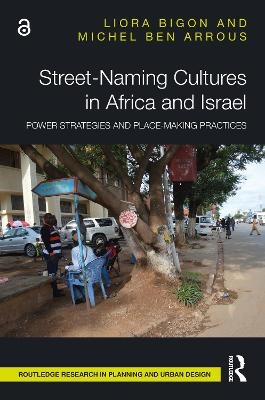
Street-Naming Cultures in Africa and Israel
Routledge (Verlag)
978-1-032-00347-4 (ISBN)
- Titel z.Zt. nicht lieferbar
- Versandkostenfrei
- Auch auf Rechnung
- Artikel merken
This book is focused on the street-naming politics, policies and practices that have been shaping and reshaping the semantic, textual and visual environments of urban Africa and Israel. Its chapters expand on prominent issues, such as the importance of extra-formal processes, naming reception and unofficial toponymies, naming decolonisation, place attachment, place-making and the materiality of street signage. By this, the book directly contributes to the mainstreaming of Africa’s toponymic cultures in recent critical place-names studies. Unconventionally and experimentally, comparative glimpses are made throughout between toponymic experiences of African and Israeli cities, exploring pioneering issues in the overwhelmingly Eurocentric research tradition. The latter tends to be concentrated on Europe and North America, to focus on nationalistic ideologies and regime change and to over-rely on top-down ‘mere’ mapping and street indexing. This volume is also unique in incorporating a rich and stimulating variety of visual evidence from a wide range of African and Israeli cities. The materiality of street signage signifies the profound and powerful connections between structured politics, current mundane practices, historical traditions and subaltern cultures.
Street-Naming Cultures in Africa and Israel is an important contribution to urban studies, toponymic research and African studies for scholars and students.
Chapters 1 and 2 of this book are freely available as a downloadable Open Access PDF under a Creative Commons Attribution-Non Commercial-No Derivatives 4.0 license available at http://www.taylorfrancis.com/books/e/9781003173762
Liora Bigon (PhD in Architecture, the University of Manchester) is an urban (planning) historian. She specialises in (post-)colonial urban history and planning cultures in sub-Saharan Africa, with an emphasis on West Africa. A senior staff member at Holon Institute of Technology, she has published widely in these fields. Her latest book – Grid Planning in the Urban Design Practices of Senegal (with Prof. E. Ross, Springer, 2020) – included an in situ survey of a dozen important Senegalese Sufi urban localities. Michel Ben Arrous is an architect by training (Ecole Polytechnique Fédérale de Lausanne, EPFL) and a doctor in geography (PhD, Université de Rouen). North Africa born, he served as a journalist in Southern and West Africa prior to a long companionship with CODESRIA (the Dakar-based Council for the Development of Social Science Research in Africa). He has lectured and published extensively on the history of geographic ideas and fantasies in their relation to citizenship crises, media and conflict, urban cultures and the production of space and place.
Foreword by Frédéric Giraut Preface 1. Introduction: Toponymic cultures and the study of place naming in African (and Israeli) contexts 2. Names in the city: Street signage in urban Africa and Israel 3. A Tale of two Brazzas: Intertwining (post-)colonial namescapes 4. Beyond street names: A tapestry of toponymic legacies in Dakar, Senegal 5. An off-the-grid toponymic ambiguity at the heart of a world city: The case of Givat Amal, Tel Aviv 6. Conclusion: The worldling of toponymic legacies Notes Bibliography Index
| Erscheinungsdatum | 28.07.2021 |
|---|---|
| Reihe/Serie | Routledge Research in Planning and Urban Design |
| Zusatzinfo | 8 Line drawings, black and white; 138 Halftones, black and white; 146 Illustrations, black and white |
| Verlagsort | London |
| Sprache | englisch |
| Maße | 156 x 234 mm |
| Gewicht | 640 g |
| Themenwelt | Naturwissenschaften ► Biologie ► Ökologie / Naturschutz |
| Naturwissenschaften ► Geowissenschaften ► Geografie / Kartografie | |
| Sozialwissenschaften ► Soziologie ► Spezielle Soziologien | |
| ISBN-10 | 1-032-00347-2 / 1032003472 |
| ISBN-13 | 978-1-032-00347-4 / 9781032003474 |
| Zustand | Neuware |
| Haben Sie eine Frage zum Produkt? |
aus dem Bereich


